How the monkey officially worked on the railway
Categories: Africa | Animals | History
By Pictolic https://pictolic.com/article/how-the-monkey-officially-worked-on-the-railway.htmlWe often use the expression: "Even a monkey can be taught this." At the same time, we mean some simple work that does not require skills and abilities. But for the monkeys themselves, such neglect could be offensive, since these animals often worked together with humans, performing responsible tasks. Jackie Baboon during the First World War was able to receive the rank of corporal and was awarded medals. Another primate of the same species, and even the namesake of the glorious warrior, worked at the end of the 19th century on the Cape Town Railway as a signalman.
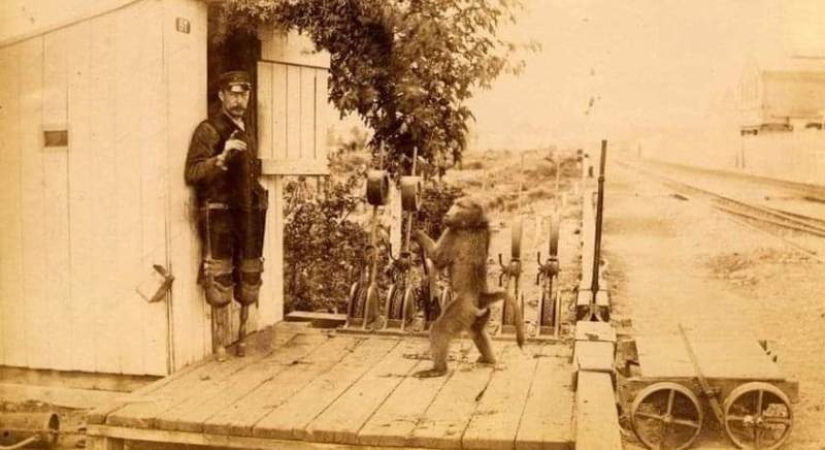
Baboon Jack didn't just live at the station and entertained the workers. He was able to become a full-time employee of the Eitenhache station of the Cape Town Railway in South Africa and even received a salary. And it all started with the fact that the signalman James Edwin Wade lost his legs due to an accident. The man worked on the railway for many years, first as a simple security guard, and then as a full-fledged specialist.

James loved his job and performed his duties very diligently. He was in good standing with his superiors and was often set as an example to others. But Wade also had one drawback — he often neglected his safety in order to get the job done faster. For the dizzying jumps on the move between the cars, he received the nickname "Jumpy" from colleagues.
But one day trouble happened to James. During one of the jumps, he stumbled and fell under the wheels of the car. His legs were cut off to the knees, which meant losing his job and vegetating on a beggarly pension. Fortunately, the man managed to convince his supervisors that he could work without legs. But it's one thing to say, and quite another to rush between cars on primitive prostheses.
After a little reflection, Wade decided that he would be more mobile not on pieces of wood, but on a wheelchair. He himself designed a light and durable means of transportation and learned to move around on it quite quickly. The usual work of a signalman was not easy for a disabled person, and by the evening James was completely exhausted. But one day, in 1881, while shopping at the local market, he found an original solution to his problem.
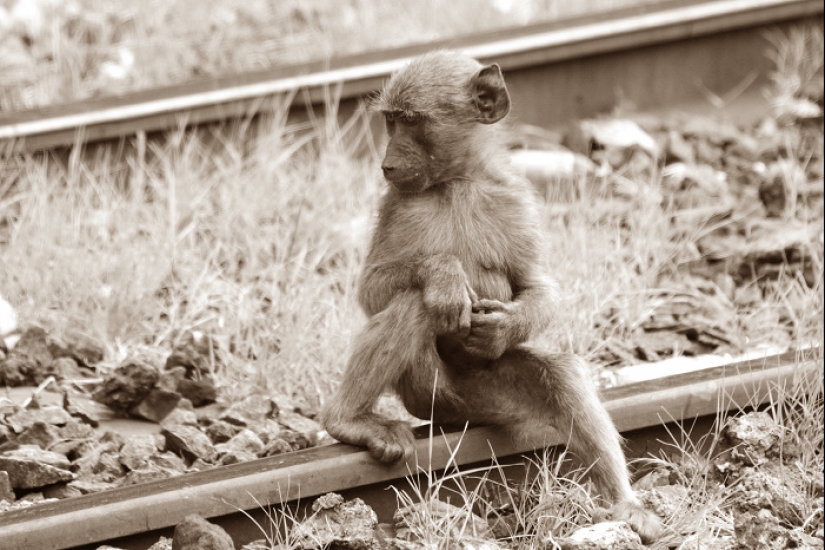
Wade saw a trained monkey helping one of the vegetable vendors at work. It was a bear baboon, a medium-sized primate common in South Africa. The animal, whose name was Jack, was pushing a cart with goods, deftly maneuvering in the market crowd. The legless railway worker thought that the monkey could also push a wheelchair, thereby making his life easier.
With great difficulty, Wade managed to persuade Jack's owner to sell the assistant. The deal was done, and although he had to pay almost all his savings for the monkey, James did not regret anything. It took only a few weeks for the smart Jack to learn how to handle his wheelchair and follow commands. The work went more fun, and most importantly, it became easier. In the evening, the signalman even had the strength to have a couple of beers with friends at the bar.
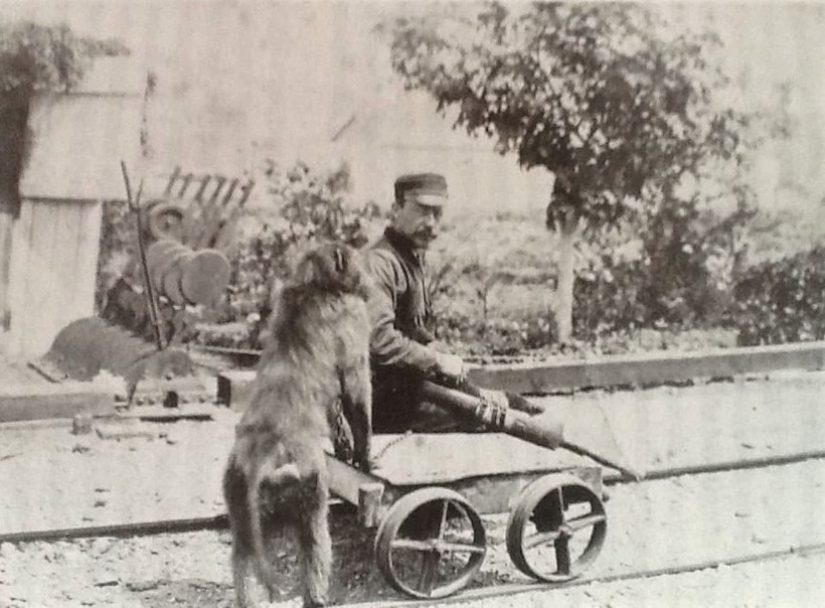
Wade doted on his assistant. Jack turned out to be smarter than expected. Very soon the monkey began to help the owner around the house. The baboon carried water from the pump, cleaned the house and carried out James' small errands. Seeing that his pet has an extraordinary mind, the legless signalman began to teach him the wisdom of his profession. It is not known how much time and effort Wade spent on his idea, but Jack began to turn the arrows and switch semaphores at his request.
A little later, Wade was surprised to notice that Jack was coping with his tasks without instructions. The baboon saw which way the trains were coming and independently made the decision to switch the arrows. Soon the whole neighborhood was talking about the amazing pet of the signalman. Onlookers reached out to his modest home, who wanted to make sure for themselves that the railway monkey was not an invention.
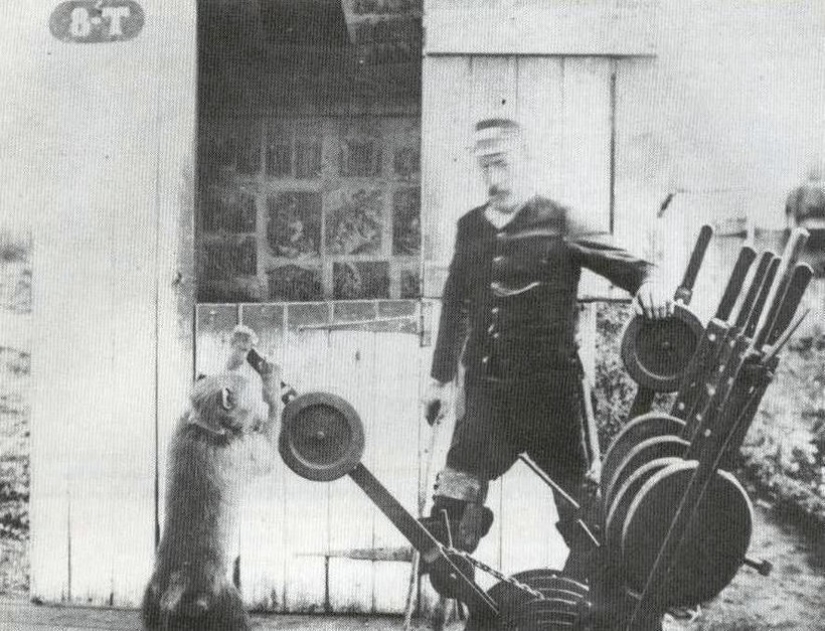
But such popularity has done Wade and his friend a disservice. The fact that a baboon is in charge of arrows and semaphores at the Eitenhache station was soon found out at the main office of the railway company. It wasn't hard to guess that James hadn't been patted on the head for his innovation. The authorities started an internal investigation, the result of which was to be the dismissal of a resourceful disabled person.
It is not known exactly what happened during the proceedings, but the baboon and its owner remained working on the railway. Moreover, Jack was accepted into the staff and began to pay him a salary. It was a modest 20 cents a day, and on Sunday the monkey was also entitled to a mug of beer at the expense of the stationmaster. Baboon passed in official documents as an assistant signalman and he even relied on a real railway uniform.

However, when it came time to get a suit and a cap, Wade wrote an official letter to the office. In it, he explained the lack of need for overalls for an assistant, due to the fact that he "has wool clothes bestowed by nature itself." At first, commissions and inspectors looked into the station, keeping an eye on strange partners. But then everyone calmed down and stopped talking about the strange employee as something unnatural.
Bear baboon Jack worked on the Cape Town Railway for 9 years. During all this time, there has not been a single emergency in the area entrusted to him. Unfortunately, the age of the outstanding primate turned out to be short-lived. Baboon, being in the prime of life, suddenly fell ill with tuberculosis. When Wade found out about his friend's illness, it was too late, and Jack died. The railwayman grieved greatly about his partner. But that didn't stop him from donating a friend's skull to the Albany Museum in Grahamstown.
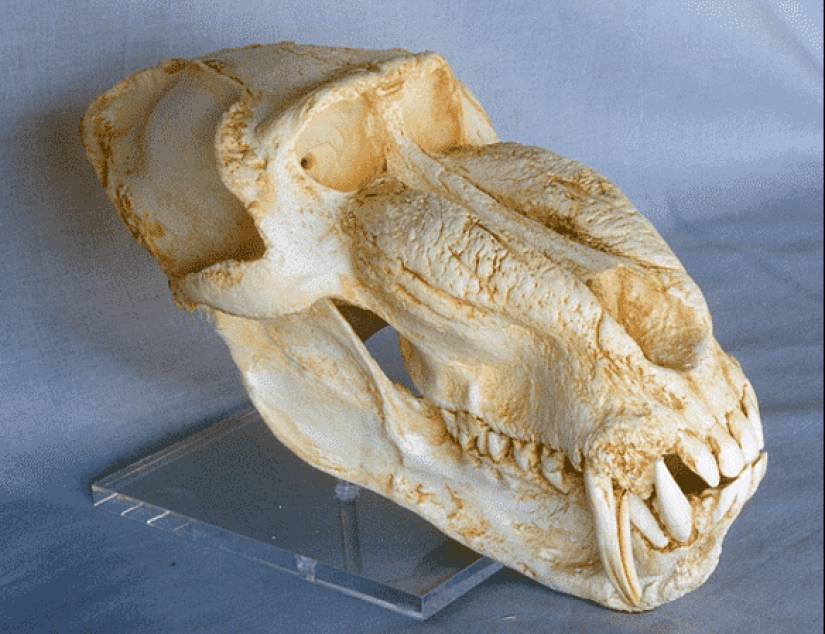
At the Eitenhache station itself, a whole gallery of old photos reminds of an unusual employee. They captured James Wide and Jack during work and leisure. This story seems incredible. But experts do not deny that the monkey could do the work of a signalman. People's Artist of Russia, trainer Aziz Askaryan said this about it:
The opinion of the circus artist can be trusted, because Aziz Mikhailovich has more than 20 years of experience working with primates. So it is quite possible that a powerful working resource is hiding in the jungles around the world, which humanity ignores in vain.
Recent articles

It's high time to admit that this whole hipster idea has gone too far. The concept has become so popular that even restaurants have ...

There is a perception that people only use 10% of their brain potential. But the heroes of our review, apparently, found a way to ...

New Year's is a time to surprise and delight loved ones not only with gifts but also with a unique presentation of the holiday ...